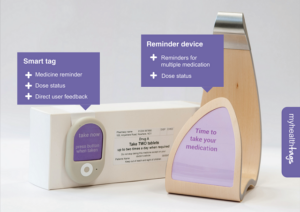Folium Optics is a UK start-up that is working with a technology to create low-power displays on plastic substrates. As well as being made of plastic – enabling flexible form factors – the displays are reflective, rather than back-lit.
Folium is initially looking at uses in the healthcare and defence sectors. Two separate products are being developed for these sectors. The first is a display tag for medication, intended to tackle the problem of poor medication adherence (the tendency of patients to stop taking the drugs that they have been prescribed). The tag would be connected to a cloud network; it could tell a patient when to take their medication and log when they have done so. Steve Kitson, co-founder and CEO of Folium, expects clinical trials to begin within 12 months.
The second application is for the defence sector. Folium believes that its technology could be used to create thin, robust plastics capable of changing colour on the fly, to create a new type of camouflage.
Part of Folium’s technology is based on an existing form of LCD technology. Similar materials to a conventional LCD are used, but are doped with dye molecules. These rod-shaped molecules are designed to orientate themselves with the liquid crystals when a voltage is applied. Both types of molecule rotate at the same time. This means that the strength of colour produced can be controlled, without polarisers and other components.
“This principle is called a guest-host LCD and has been known for some years, although it went out of favour as interest focused on backlit displays”, said Kitson. “It has been a little neglected; so we are revitalising it, improving the materials and combining them with flexible plastics”.
Folium Optics was established by Kitson and John Rudin, both former employees of HP Labs in Bristol. A video of the camouflage technology can be viewed at http://tinyurl.com/qzntfsq.

